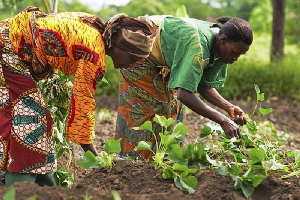By Ghana News
Copyright ghanamma

A total of 90 farmers and 30 agricultural extension officers have benefited from a capacity development workshop for commercial and small seed yam entrepreneurs.
It was under the yam component of the Programme for Seed System Innovation for Vegetatively Propagated Crops in Africa (PROSSIVA).
The training, held at Nyankpala near Tamale, was led by the International Institute of Tropical Agriculture (IITA) in collaboration with the Council for Scientific and Industrial Research–Savanna Agricultural Research Institute (CSIR-SARI), the Consultative Group on International Agricultural Research (CGIAR), and Sahel Consulting.
It sought to strengthen yam seed systems in the country.
Participants were introduced to innovative yam seed production methods, business management practices, and the importance of seed certification.
They received guidance on record-keeping, demand planning, and effective engagement with both formal and informal seed market actors.
Professor Morufat Balogun, a geneticist and lead of the yam component of PROSSIVA, speaking during the workshop, said the initiative was designed to remove the bottlenecks farmers faced in accessing quality planting materials.
He said, “Our vision is to increase farmers’ access to quality yam planting materials by fostering stronger collaboration between developers, researchers, and entrepreneurs.”
He added that Ghana remained the world’s leading yam exporter with the crop contributing about 60 per cent of the country’s agricultural GDP.
Hajia Hawa Musah, Director, Northern Regional Department of Agriculture, who was represented during the event, highlighted the significance of the production of yam to the country’s food and income security.
She said in 2015 the region recorded 2.3 million metric tons of yam cultivated on 136,000 hectares of land, adding output increased steadily to 2.6 million tons in 2016, dropped slightly to 2.3 million in 2017, and peaked at 2.83 million metric tons in 2018.
She said, “This upward trend was not sustained as production dropped sharply to 1.7 million tons in 2019 and further declined to 1.5 million metric tons in 2022 due to persistent challenges such as poor farm practices, high post-harvest losses, pests and diseases, and limited access to clean seed.”
She commended the partners for the initiative, saying improving farmers’ access to quality planting materials would help address long-standing bottlenecks and strengthen the yam value chain.
The workshop, which brought together farmers from the Northern and Savannah Regions, underscored the need for sustained investment in seed systems to boost productivity, reduce losses, and enhance the country’s global competitiveness in yam exports.



